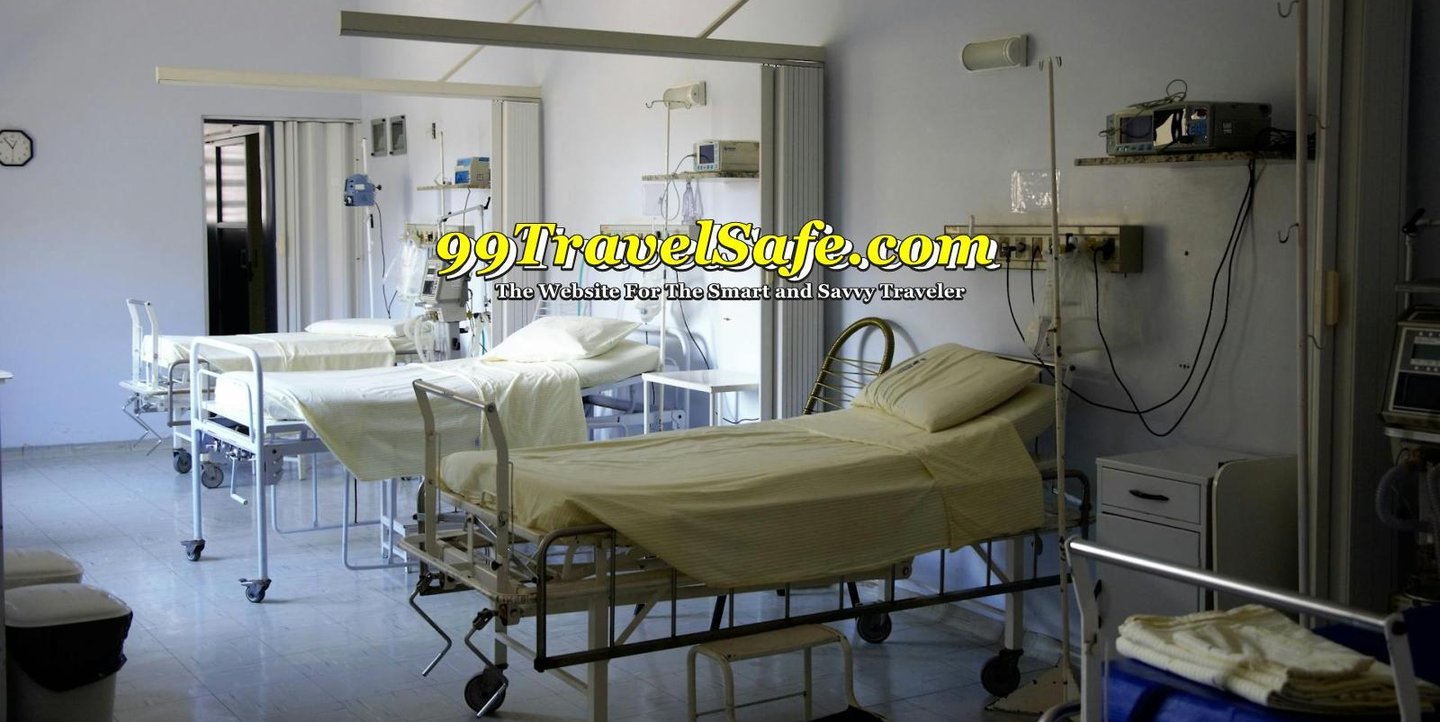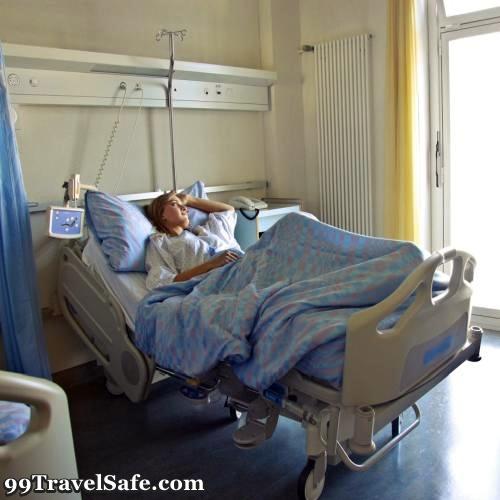

99TravelSafe.com
The Website For The Smart and Savvy Traveler
If You Are Hospitalized During Travel!


Related Pages - Please Also See;
If You Need Medical Attention Abroad
If you need emergency medical attention abroad, make sure you have enough money or a credit card with you. You will often have to pay upfront for medical care abroad, even if you are fully insured.
Consider whether you need help with translation, particularly if you are being asked to make important and long-term decisions.
If you have Travel Insurance
You, your family or someone travelling with you should:
-- Contact your insurance company as soon as possible – it should have a 24/7 emergency number
-- Check if your insurance covers you for the help you need, including medical translation or interpreting services, keep any receipts or doctors’ notes – your insurance company will need them
-- If you’re not sure if a family member or friend has insurance, try to check with their bank, tour operator or travel agent they made their booking with.
If You Are Not Covered by Travel Insurance
If you’re not covered by travel insurance, you’ll usually need to pay for your medical costs yourself. It is your responsibility to make sure you can access enough money to pay for all your costs and to avoid getting into financial difficulties abroad.
Mental Health Emergencies and Hospitalisation Abroad
Facilities, resources and understanding of mental health issues vary from country to country. Local laws, policies and attitudes towards mental health in the country you’re in will affect the type of psychiatric care you may receive.
The rules on mental health hospitalisation or detention in another country may be different to those in the West. The local authorities may make you leave the country. This could happen if you have been detained or hospitalised under local mental health laws
How Your Embassy or Consulate Can Help You
If you are in hospital and need help from your embassy or consulate, call them or ask a family member or friend to do this for you. In certain circumstances some local authorities will tell them about you, and they will contact you as soon as possible. Their staff may be able to visit you, to provide in person assistance depending on location and timing and whether you are able to speak by phone. They will assess your vulnerability based on factors such as your medical condition as reported to them (note their staff is not medically trained)
The Support Available to You
Your embassy or consulate can offer some support if you have a medical emergency or are hospitalised abroad. Where they have your consent, they can
-- Contact your family or friends in your country to tell them that you are in the hospital, if you cannot do this yourself
-- Provide contact details, or refer you directly, to any local organisations that may be able to support you
-- Guide medical staff abroad to contact local medical staff (in your country) or your insurance company
-- Help you communicate with hospital staff (note this is not a formal translation service, but the embassy can provide details of English-speaking interpreters)
-- Talk to your travel representative or travel insurance company
-- Provide information about local medical facilities
-- Raise concerns you have about your treatment or welfare with the local authorities
Your Embassy or Consulate Cannot
-- Buy or pay for your medication, medical bills or other expenses
-- Pay for you to return to your country
-- Give you medical advice
-- Get you better treatment in the hospital than is given to local people
-- Provide formal translation or interpretation of medical language documents or any other supporting documents
-- Get you discharged from the hospital
-- Intervene in any local legal process resulting from a mental health emergency
-- Force you to return to your country against your will
-- Stop you from being deported if the local authorities decide you must leave the country
Going Abroad for Medical Treatment and Planned Elective Surgery
If you travel abroad for medical treatment or planned surgery (sometimes called medical tourism), you should be aware of the potential risks. The standard of medical facilities, qualifications and treatments abroad can vary widely and may differ from your local standards. There have been complications and deaths abroad from medical procedures.
Your embassy cannot usually help if you have travelled abroad for medical treatment, for example, if you have issues with the care received or costs involved. Planned medical treatment is considered a commercial arrangement.
You Should.....
-- Be cautious of websites selling cosmetic surgery as part of a holiday
-- Do your own research – private companies have a financial interest in arranging your medical treatment abroad
-- Discuss plans with your local doctor before committing to any treatment abroad
-- Check how you will get home if there is an emergency, and how much it will cost
-- Check when you can fly home – air travel after major surgery increases your risk of a blood clot, which can be life-threatening
-- Be aware that healthcare after your treatment may be limited in the country you are travelling to
-- Check whether your insurance covers you, and be aware that it may not be valid for some costs (for example, if there are complications after the surgery). Be aware that standard travel insurance does not normally cover you if you traveled abroad for elective surgery
Getting Prescriptions
If you need prescription medicine while you’re abroad, speak to a local pharmacist. Many countries accept prescriptions issued in Western countries.
Returning to Your Country
Medical Repatriation or Evacuation
If you are ill abroad, you may need to return home while still receiving care (medical repatriation) because specialist care is not available locally!
-- Your travel insurance company should arrange your medical repatriation or evacuation. If your insurance does not cover this, you will have to arrange and pay for it yourself. You can check the list of medical repatriation companies to get the support you need.
-- Your embassy or consulate cannot arrange medical repatriation or pay for it!
-- If you are returning on a scheduled flight, you may need to provide the airline with advance confirmation from your treating doctors that you are fit to fly.
Article Continues After Ads↓↓↓↓
Your local health insurance does NOT normally cover you abroad. Buying travel insurance is a must.
6 Things to do to Ensure Healthcare is Available to You in a Foreign Country
-- Confirm with your local insurance company the extent of your coverage while abroad and the procedure for submitting claims for international health care expenses.
-- Decide whether you need travel insurance and/or medical evacuation insurance policy.
-- Write down the addresses and telephone numbers of your embassies and consulates in the countries you will be visiting.
-- Bring a letter from your doctor if you are being treated for a chronic condition, listing your diagnosis and current medications (including the generic names for the drugs and dosage, since brand names vary by country).
-- Always bring your insurance card and a claim form information and phone numbers, whether you're using your individual insurance policy or a travel insurance policy.
-- Be sure the information in your passport about whom to contact in an emergency is correct and up-to-date.
Final Checklist If You Are Facing Medical Problems and May Need to be Hospitalized Abroad
Contact Your Embassy/Consulate
Seek Assistance
Your embassy or consulate can provide crucial support, including finding English-speaking healthcare providers, hospitals, and information about the local healthcare system.
Family Communication
They can help you get in touch with your family and address any visa issues that may arise during your medical emergency.
Information and Resources
They can provide information about hospitals, healthcare facilities, and other relevant resources in the area.
Travel Insurance and Financial Considerations
Review Your Policy
Check your travel insurance policy to see what medical expenses are covered and what the process is for filing claims.
Understand Costs
Be prepared for potential costs of treatment, medication, and repatriation, especially if you don't have comprehensive travel insurance.
Repatriation
If you are too ill or injured to travel commercially, consider the possibility of a medical flight home.
Other Important Considerations
Documentation
Keep copies of your passport, visa, and any other important documents with you, and make sure your family has copies as well.
Medications
Ensure you have enough of any necessary medications, and that you are aware of any local regulations regarding medication.
Stay Informed
Keep up-to-date on the situation and any changes in your health or the local situation
